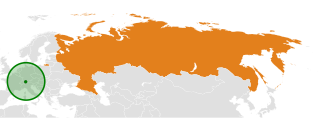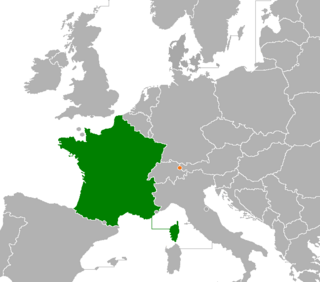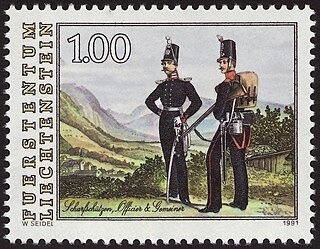
Liechtenstein's foreign economic policy has been dominated by its customs union with Switzerland. This union also led to its independent membership in the European Free Trade Association (EFTA) in 1991. Unlike Switzerland however, Liechtenstein is part of the European Economic Area.

Political identity came to the territory now occupied by the Principality of Liechtenstein in 814, with the formation of the subcountry of Lower Rhætia. Liechtenstein's borders have remained unchanged since 1434, when the Rhine established the border between the Holy Roman Empire and the Swiss cantons.

Hans Brunhart is a politician and journalist from Liechtenstein who served as Prime Minister of Liechtenstein from 1978 to 1993. He previously served as Deputy Prime Minister of Liechtenstein from 1974 to 1978, under the government of Walter Kieber.

The German National Movement in Liechtenstein was a Nazi party in Liechtenstein that existed between 1938 and 1945.
Liechtensteiner Vaterland is the largest daily newspaper in Liechtenstein. Published by Vaduzer Medienhaus AG, it is the official newspaper of the Patriotic Union party.

Diplomatic and economic relations between Switzerland and Liechtenstein have been close, with Switzerland accepting the role of safeguarding the interests of its smaller neighbour, Liechtenstein. Liechtenstein has an embassy in Bern. Switzerland is accredited to Liechtenstein from its Federal Department of Foreign Affairs in Berne and maintains an honorary consulate in Vaduz.
The Christian-Social People's Party, often shortened to simply the People's Party, was a social liberal political party in Liechtenstein. It tended to be more popular in the Oberland, and supported closer ties with Switzerland as opposed to Austria. Founded in 1918, the Christian-Social People's Party and the Progressive Citizens' Party (FBP) were the first political parties in Liechtenstein.

Liechtenstein Homeland Service was a political party in Liechtenstein that advocated corporate statism and the abolition of party politics.

Germany–Liechtenstein relations are the diplomatic relations between Germany and Liechtenstein. Both states are members of the Organization for Security and Cooperation in Europe (OSCE), the Council of Europe and the European Economic Area.
Marxer & Partner Rechtsanwälte is a law firm based in Vaduz, Liechtenstein. It is the largest law firm in the country.

Foreign relations between Russia and it's predecessors with Liechtenstein date back to the Napoleonic wars. Both countries established diplomatic relations on 30 January 1994. Since then, relations between the two countries have been distant, with Liechtenstein condemning the Russian invasion of Ukraine.

Wilhelm Beck was an advocate and political figure from Liechtenstein who was one of the founders of the Christian-Social People's Party and served as the President of the Landtag of Liechtenstein from 1922 to 1927.

Leopold Freiherr von Imhof was an Austrian civil servant who served as the Governor of Liechtenstein from 1914 to 1918.
The November 1918 Liechtenstein putsch, also known as the Beck putsch was a de facto coup d'état by the leaders of the Christian-Social People's Party against the government of Governor of Liechtenstein, Leopold Freiherr von Imhof. The coup forced Imhof's government to resign and established a Provisional Executive Committee in his place until 7 December.

The 1992 Liechtenstein constitutional crisis culminated on 28 October 1992 when Hans-Adam II called for a referendum regarding Liechtenstein's accession to the European Economic Area to be held before the corresponding referendum in Switzerland, against the countries' custom union and the wishes of the government and the Landtag of Liechtenstein.

Foreign relations between France and Liechtenstein date back to the Napoleonic wars. Both countries established diplomatic relations on 27 August 1992. Since then, relations between the two countries have been stable.

Karl Freiherr Haus von Hausen was an Austrian noble and civil servant who served as the Governor of Liechtenstein from 1861 to 1884. Hausen was born into an Austrian noble family of Franconian origins, which was amalgamated under the title 'von Hausen' by Francis II in 1797.

The military history of Liechtenstein originates back to its predecessors in the County of Vaduz and Lordship of Schellenberg. Liechtenstein disbanded its army in 1868, and has had no standing army since. However, under the constitution of Liechtenstein citizens are still obligated to defend the country in the event of an external threat, and the army may be reformed if deemed necessary.

The Fourth Hans Brunhart cabinet was the governing body of Liechtenstein from 5 June 1989 to 26 March 1993. It was appointed by Hans-Adam II and was chaired by Hans Brunhart.















